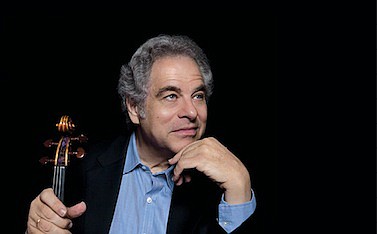- April 19, 2024
-
-
Loading

Loading

Itzhak Perlman never felt the crushing oppression of Nazi occupation or suffered the horrors of concentration camps, but his world was nonetheless shaped by the events that took place mere years before his birth.
His parents were fortunate to leave Poland in the 1930s for what would become Israel, his grandparents and other family members stayed behind hoping like so many others that the trouble would pass and they would be able to stay at home.
History tells the ugly truth though, from the night of terror, destruction and persecution in 1938 known as Kristallnacht or the Night of Broken Glass, to the liberation of the final concentration camp, precious little would remain for Jews to rebuild their lives.
For Perlman it would mean growing up without any relatives older than his parents. No grandparents to tell him stories, teach him songs or the words of ancient prayers.
He would grow up in a world scarred by events of the past, bearing his own burdens from a bout with polio suffered at the age of four.
Many people would find such a beginning an excuse for bitterness and anger, instead Perlman picked up a violin and showed the world, through music, all the anguish, heartache, beauty and joy the human soul can possess.
“Music is a part of society’s soul, that emotional experience when you hear music is something society needs,” Perlman said.
From performances on “Sesame Street” to the inauguration of President Obama, Perlman has shared his talent and his sense of humor, delighting audiences of all ages.
“It makes me feel old to talk about it now, but playing on ‘Sesame Street’ was really a lot of fun, meeting all the characters, like Big Bird and that guy in the trash can … Oscar, was really cool,” Perlman said.
“Not the same kind of excitement as playing the White House though, that was exciting because of what it stands for, the history you know, I was always excited to go there.”
Perlman, known as much for his humor and humility as for his music, will visit Rollins College on Nov. 7 as part of the Winter Park Institute’s speaker series.
For more information on Kristallnacht, please visit ushmm.org/wlc/en/article.php?ModuleId=10005201
For more information on Kristallnacht commemorative events in Central Florida, please visit kristallnacht2013.org
The event, held in conjunction with others throughout Central Florida, commemorates the 75th anniversary of Kristallnacht, which occurred the night Nov. 9, 1938 in towns and cities across Germany and Austria.
Throughout that night and into the next morning, Jewish homes, businesses and synagogues were looted, destroyed, burned or otherwise desecrated. As many as 100 people were killed in the “Night of Broken Glass,” so named for the shattered windows that lined the streets when the sun came up the next morning.
Up to 30,000 men were rounded up and sent to concentration camps, marking the beginning of large-scale Jewish incarcerations for no other reason than their religion.
Perlman returned to a subject very close to his heart when he agreed to play on the soundtrack for the 1993 best picture Oscar-winner “Schindler’s List.” His haunting violin solos pay tribute to the tragedy while offering a glimpse of the human spirit and determination of the survivors.
It is a common theme throughout his work, that determination of spirit and unquenchable zest for life.
Recently he has brought his considerable talent to another project close to home in the form of Klezmer music.
“I find it an amazing pleasure, to return to the music I was born with,” Perlman said. “Until recently, I had never played it, but once I began, I realized it came naturally, the sound was something I was used to as a child growing up in Israel.”
Klezmer music is the traditional Jewish folk music of Eastern Europe, brought over by immigrants and Holocaust survivors to the United States. It is often heard at Jewish weddings and celebrations.
Reviving this traditional music has been the project of many Jewish musicians, such as Perlman, since its near loss following the Holocaust.
In addition to a busy schedule of performances and appearances the world over, the 68-year-old musician dedicates much of his time to teaching the next generation of musicians through the Perlman Music Program founded by his wife, Toby.
“Besides a good meal, some of my greatest joys come from playing, conducting and teaching,” he said, “each one supports the other.”
“One of the great challenges when you grow up with music and you are getting a little older, is to make sure that you don’t get bored by what you are doing, especially when you have done it so many years. And I am happy to report that I am far from being bored, I always find it very, very exciting.”